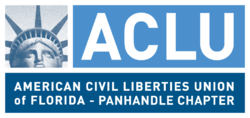Difference between revisions of "ACLU of Florida Panhandle Chapter"
m (ACLU moved to ACLU of Florida Panhandle Chapter) |
m |
||
| Line 20: | Line 20: | ||
|website=[http://www.aclufl.org/panhandle/ aclufl.org/panhandle] | |website=[http://www.aclufl.org/panhandle/ aclufl.org/panhandle] | ||
}} | }} | ||
| − | The '''ACLU of Florida Panhandle Chapter''' is the local branch of the [[Wikipedia:American Civil Liberties Union|American Civil Liberties Union]]. The chapter was first organized in [[1988]], but the charter expired around [[1995]]. It was renewed on [[November 11]], [[2000]], when 35 members met at [[Washington High School]] to approve a new set of bylaws.<ref>"ACLU forms chapter in Panhandle." ''Pensacola News Journal'', November 12, 2000.</ref> | + | The '''ACLU of Florida Panhandle Chapter''' is the local branch of the [[Wikipedia:American Civil Liberties Union|American Civil Liberties Union]]. The chapter was first organized in [[1988]], but the charter expired around [[1995]]. It was renewed on [[November 11]], [[2000]], when 35 members met at [[Washington High School]] to approve a new set of bylaws.<ref>"ACLU forms chapter in Panhandle." ''Pensacola News Journal'', November 12, 2000.</ref> [[As of|As of July 2007]], the Panhandle Chapter had about 800 members and financial supporters.<ref>According to regional director Susan Watson</ref> |
The Panhandle Chapter serves the four western counties of Florida and is made up of three groups: the [[Escambia County|Escambia]]/[[Santa Rosa County|Santa Rosa]] group, the [[University of West Florida]] group, and the [[Okaloosa County|Okaloosa]]/[[Walton County|Walton]] group. The ACLU of Florida's Northwest Region, which consists of the Panhandle and Bay County chapters, is headquartered in Pensacola. [[Susan Watson]] became the regional director on [[July 1]], [[2005]]. On [[March 5]], [[2007]], [[Benjamin Stevenson]] became work as the region's first staff attorney.<ref>http://www.inweekly.net/article.asp?artID=4374</ref> | The Panhandle Chapter serves the four western counties of Florida and is made up of three groups: the [[Escambia County|Escambia]]/[[Santa Rosa County|Santa Rosa]] group, the [[University of West Florida]] group, and the [[Okaloosa County|Okaloosa]]/[[Walton County|Walton]] group. The ACLU of Florida's Northwest Region, which consists of the Panhandle and Bay County chapters, is headquartered in Pensacola. [[Susan Watson]] became the regional director on [[July 1]], [[2005]]. On [[March 5]], [[2007]], [[Benjamin Stevenson]] became work as the region's first staff attorney.<ref>http://www.inweekly.net/article.asp?artID=4374</ref> | ||
Revision as of 04:09, 17 July 2007
| ACLU of Florida Panhandle Chapter | |
| Established | 1988 2000 |
| Membership | around 800 |
| Regional director | Susan Watson |
| Staff | Benjamin Stevenson, attorney |
| Key people | Linda Armacost, chairperson |
| Website | aclufl.org/panhandle |
The ACLU of Florida Panhandle Chapter is the local branch of the American Civil Liberties Union. The chapter was first organized in 1988, but the charter expired around 1995. It was renewed on November 11, 2000, when 35 members met at Washington High School to approve a new set of bylaws.[1] As of July 2007, the Panhandle Chapter had about 800 members and financial supporters.[2]
The Panhandle Chapter serves the four western counties of Florida and is made up of three groups: the Escambia/Santa Rosa group, the University of West Florida group, and the Okaloosa/Walton group. The ACLU of Florida's Northwest Region, which consists of the Panhandle and Bay County chapters, is headquartered in Pensacola. Susan Watson became the regional director on July 1, 2005. On March 5, 2007, Benjamin Stevenson became work as the region's first staff attorney.[3]
Notable cases
Issues
According to the group's website, the top issues faced by the chapter include:
- Excessive force of law enforcement
- LGBT rights
- Religious freedom
- Racial justice
- Reproductive rights
- Free speech
References
- ↑ "ACLU forms chapter in Panhandle." Pensacola News Journal, November 12, 2000.
- ↑ According to regional director Susan Watson
- ↑ http://www.inweekly.net/article.asp?artID=4374
